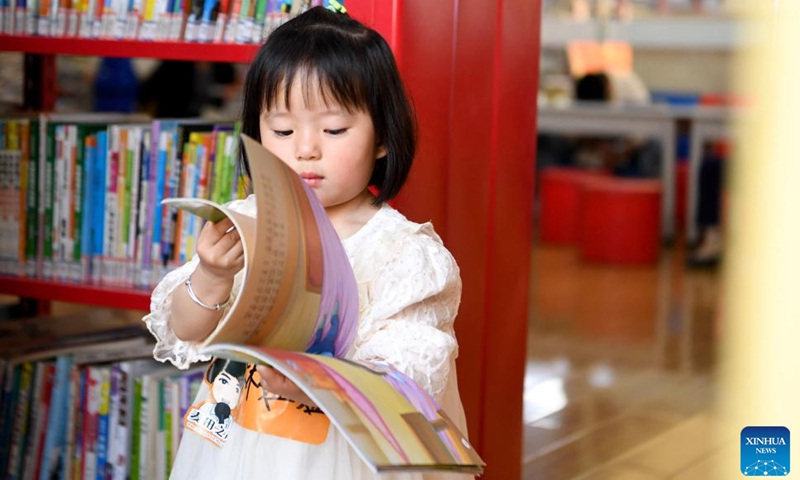
A child reads a book at a library during the May Day holiday in Pingdingshan City, central China's Henan Province, May 1, 2023. (Xinhua/Hao Yuan)
A total of 7.5 million yuan ($1.03 million) in special funding have been allocated to support companies in providing childcare assistance for their employees. This move is aimed to further promote support for childcare and address the long-standing problem faced by many working couples.
Experts believe offering childcare services for employers will help increase the willingness of dual-income families to have children.
The move was announced at a promotion meeting on childcare services for employers jointly held by the All-China Federation of Trade Unions (ACFTU) and the National Healthcare Commission (NHC) from Friday to Saturday, China Central Television (CCTV) reported. At the meeting, the two bodies summarized and exchanged information on the national employer's childcare support in 2022 and proposed key tasks.
The 7.5 million yuan funds will be allocated to 75 companies that have been recognized as National Caring Childcare Employers in 2022. In addition, the provincial union will provide matching grants to these companies with an amount no less than the amount of the special funding.
He Yafu, an independent demographer, believes this grant will help address the childbirth challenges of many families at a practical level.
"Many families in China are dual-income families, and kindergartens now only admit children over the age of three and the time spent in kindergartens does not fully cover the parents' working hours," He told the Global Times on Sunday. "Under the current situation, who will take care of the children in their early years has been a practical problem for many dual-income families."
According to data released by the NHC in 2021, China's enrollment rate for children under three years old was only 5.5 percent. He pointed out that this figure had a big gap with developed countries, like France and Sweden, where the figure can reach 50 percent.
Vigorous development of inclusive childcare services and support for employers in a position to provide childcare services for employees will help solve the conundrums of dual-income families and therefore increase the willingness of the young generation to have children, He said.
Earlier on Friday, a Chinese company, Trip.com, announced the launch of a fertility subsidy program, under which its employees who have been working at the firm for over three years could receive up to 50,000 yuan ($6,887) for each newborn baby they have.
He noted that employers who are able to do so can provide childcare assistance to employees with children under the age of three. For example, the funds provided by ACFTU can be utilized to build childcare facilities in the company. In addition, the fees charged by childcare centers should be kept as low as possible to alleviate the financial strain on families with two working parents.
He suggested that the ACFTU and the NHC should study and establish guidelines for the establishment and operation of childcare facilities applicable to employers, in order to promote the standardized development of childcare services across different employers.
The two organs said they will continue to work on recommending and announcing the 2023 National Caring Childcare Employers, and promote steady and orderly development of childcare services among employers.
At the same time, they vowed to carry out extensive research and studies on childcare services for employers, so as to gain a deeper understanding of and gradually promote solutions to the difficult problems employers face in terms of childcare services.
The measures are seen as the latest incentives to encourage Chinese young generation to have larger families, as China's population in 2022 shrank for the first time in over 60 years amid a falling birth rate. In August 2022, 17 Chinese government departments jointly released a guideline on support policies in finance, tax, housing, employment, education and other fields to create a fertility-friendly society and encourage families to have more children.



